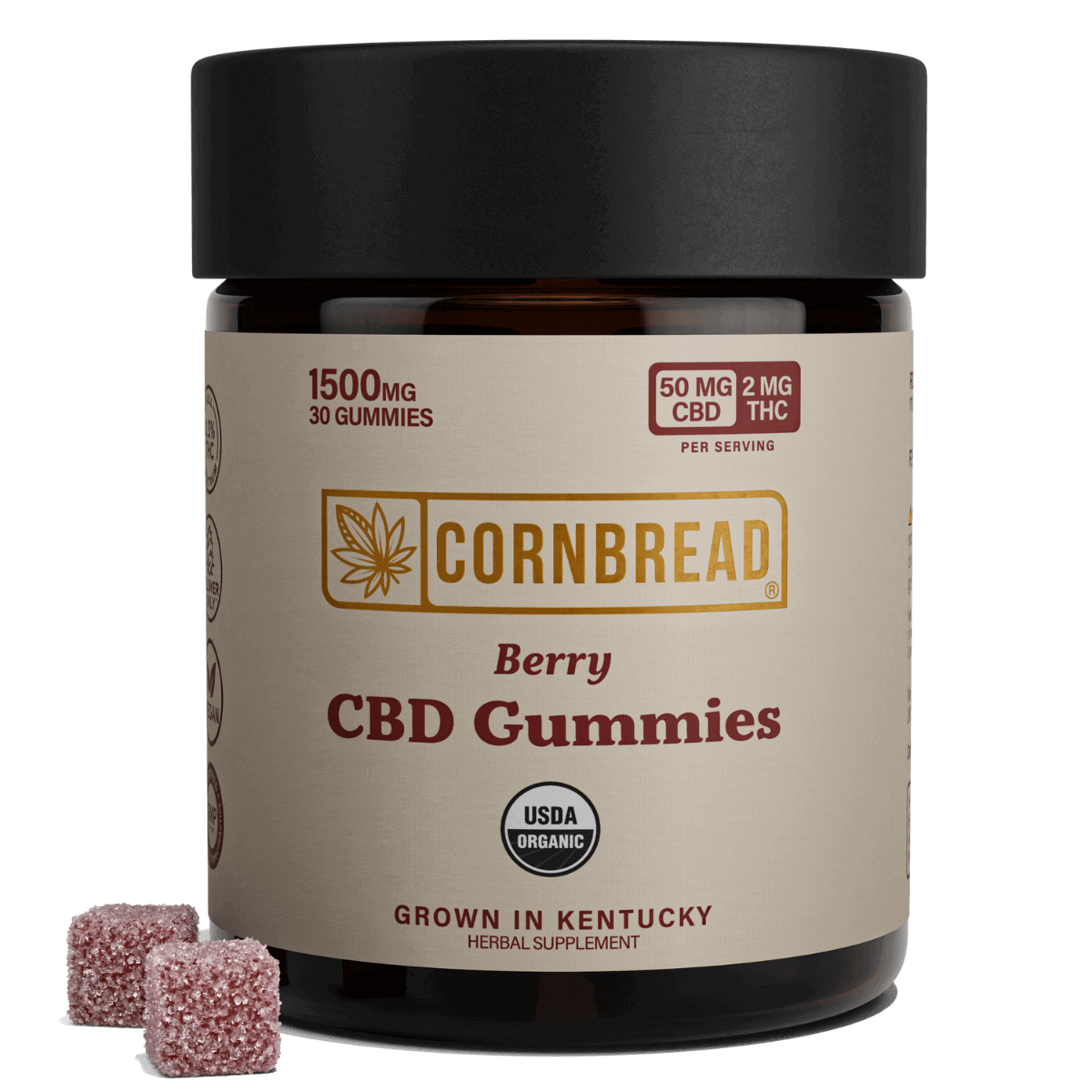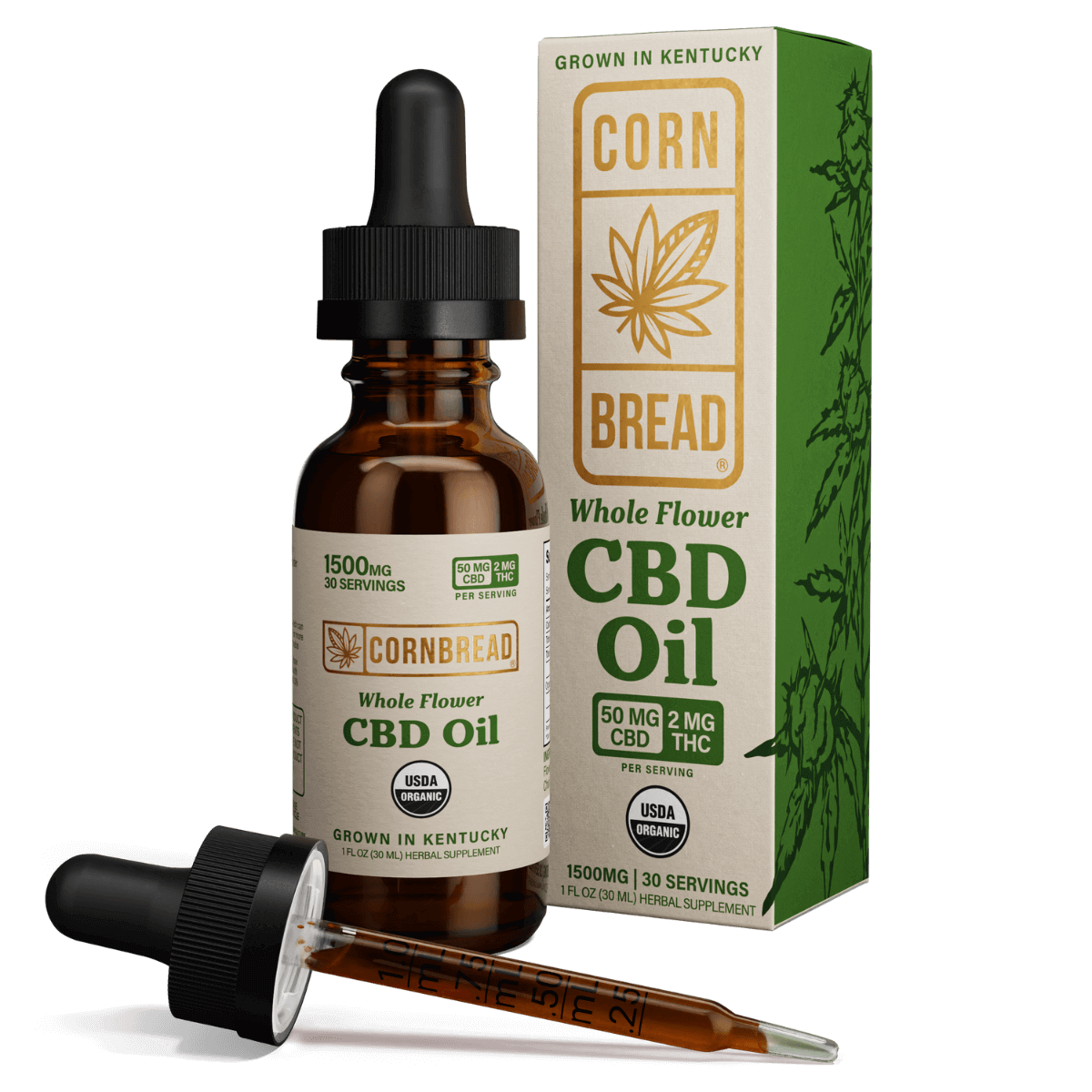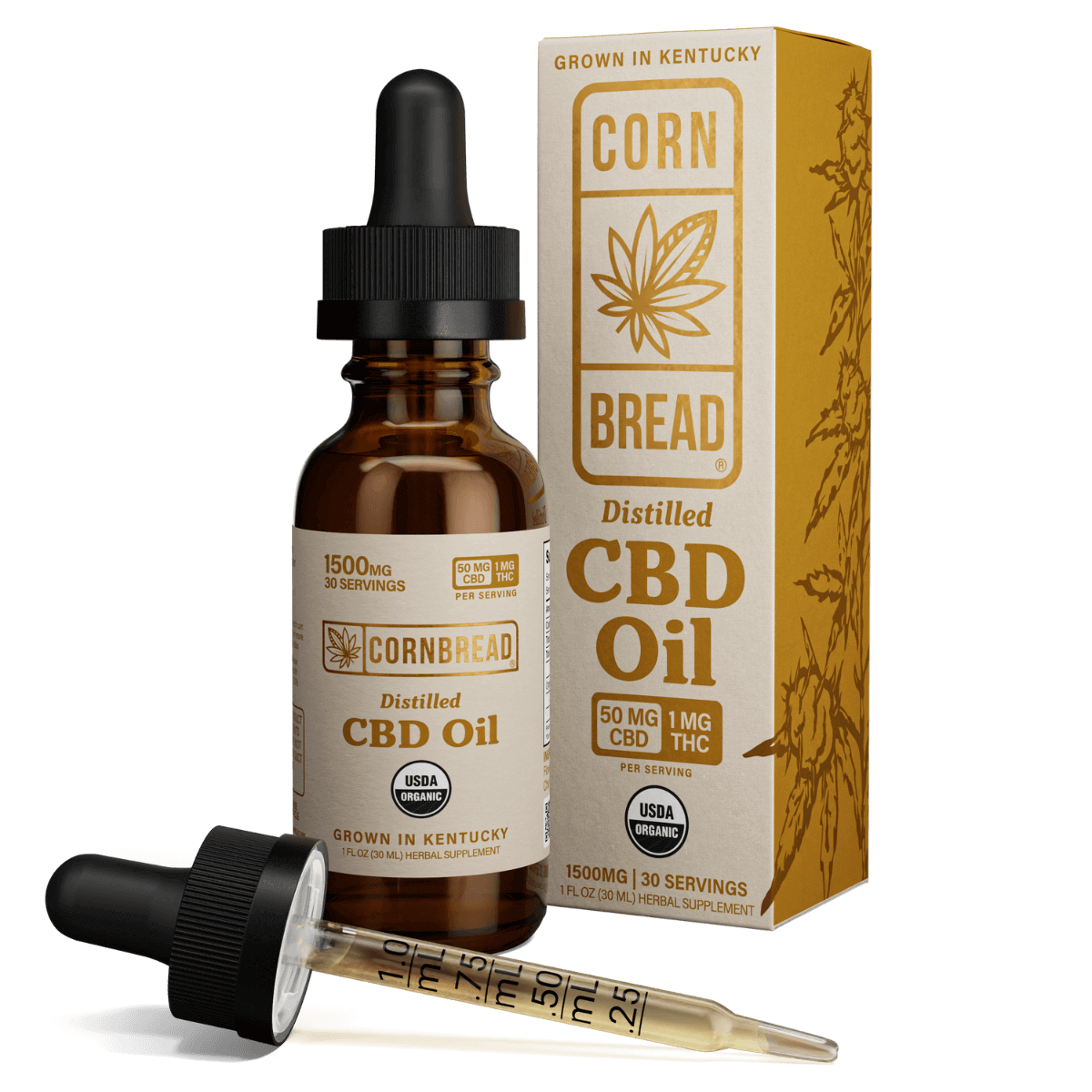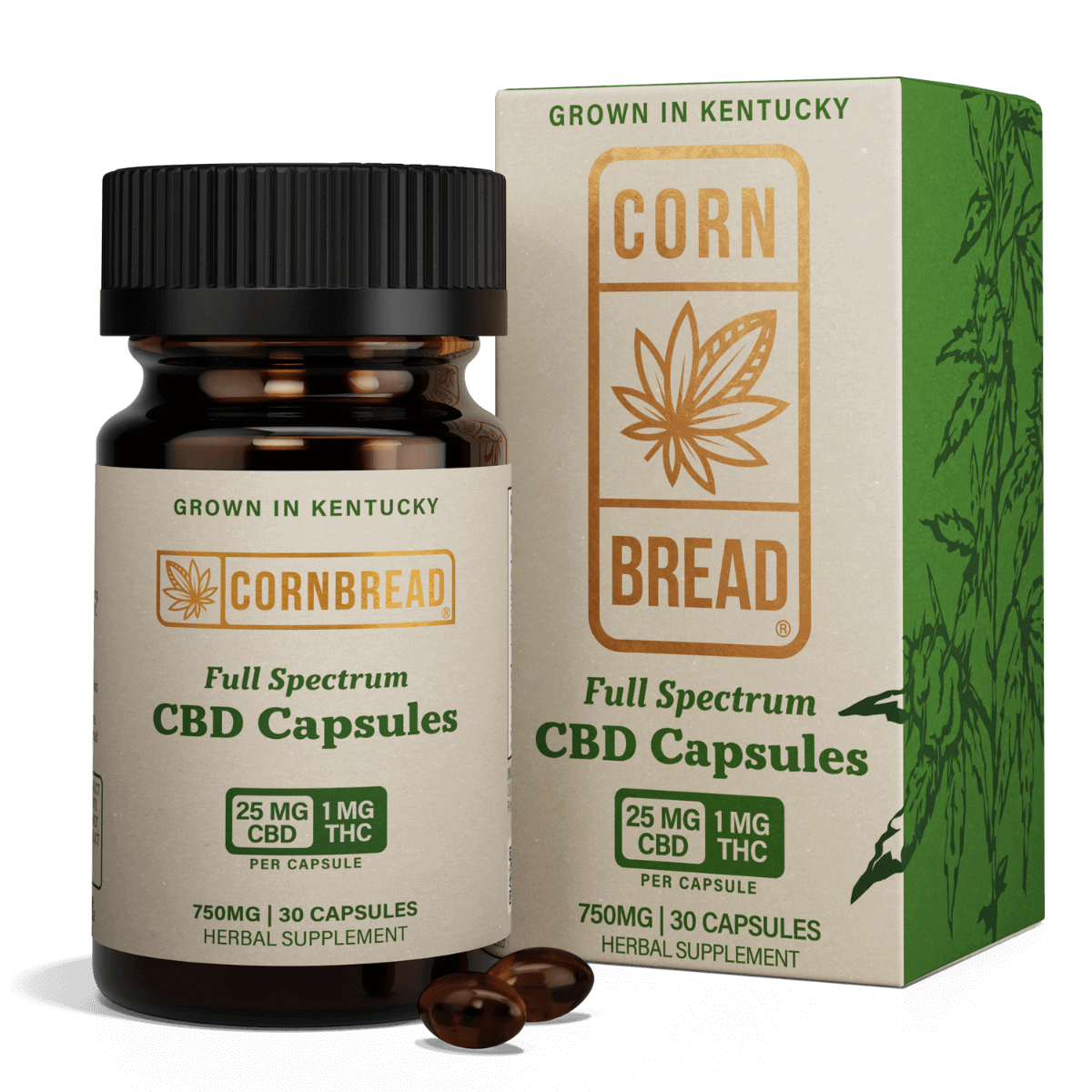Table of Contents
- WHAT IS BETTER: CBD OIL OR CAPSULES?
- WHAT IS CBD?
- WHY ARE YOU TAKING CBD?
- WHY CHOOSE CBD CAPSULES VS CBD OIL?
- HOW TO CHOOSE CBD CAPSULES AND CBD OIL
- WHEN CAN YOU EXPECT TO NOTICE RESULTS?
- CBD OIL BIOAVAILABILITY
- CBD CAPSULE BIOAVAILABILITY
- ONSET OF ACTION
- HOW TO MAKE YOUR CBD OIL MORE BIOAVAILABLE
- WHY CHOOSE CORNBREAD HEMP?
- CONCLUSIONS
What is better: CBD Oil or Capsules?
What's the best way to take cannabidiol (CBD)? The answer depends upon your specific needs. As you decide to add CBD to your daily wellness routine, you may ask yourself: Which is better in the battle of CBD oil vs capsules?
Many people prefer to take their daily dose of cannabidiol as CBD capsules. It’s a quick, convenient way to take CBD without the taste of the sublingual CBD oil. But the informed CBD consumer also knows that taking CBD oil sublingually can be more effective.
If you’re interested in learning more about why some people choose CBD capsules and why others choose CBD oil, you came to the right place. We wrote this helpful blog post to tell you the difference between CBD capsules and CBD oils, and which might be a better choice for you.
At Cornbread Hemp, we offer a 25 mg CBD capsule in a 30-count amber glass bottle. Our customers love them. We also offer the strongest USDA certified organic CBD oil allowed by law. We offer our organic CBD oil in two formulas: Whole Flower and Distilled. Our customers tell us that our Whole Flower CBD oil works best for the evening, and our Distilled CBD oil works best for daytime.
What is CBD?
CBD is an abbreviation for cannabidiol, a compound found in hemp. Scientists call these compounds “phytocannabinoids” because they are cannabinoids found in plants. As opposed to “endocannabinoids,” which are cannabinoids produced inside the body.
The endocannabinoid system (ECS)is a recently discovered network in the body. The ECS acts as a master regulator for many different functions. CBD may interact with the ECS, which may help to support general wellness.
Many people associate cannabis with getting “high” from the cannabinoid known as THC. In 2018 Congress passed the Farm Bill, which allowed cannabis containing less than 0.3 percent THC (defined as "hemp") to be grown and cultivated in the United States. This opened the door for CBD products made from legal full spectrum hemp extract containing trace amounts of THC — not more than 0.3 percent. This is not enough THC to make you feel high.
Some people are afraid of THC, and they worry about trying full spectrum CBD products as a result. Despite those concerns, Cornbread Hemp keeps a legal amount of THC in our CBD products. Many studies show that full spectrum works better than CBD isolate or “THC-free” broad spectrum.
Why Are You Taking CBD?
People from all walks of life come to cannabidiol (often abbreviated as “CBD”)1 because of recent anecdotal reports that CBD has helped them.2 These reports contain a range of delivery methods like CBD oils, CBD capsules, and topical applications.3,4
However, the research into other uses for CBD is considerably less advanced and often pre-clinical in nature. That means the studies that have been published involving CBD have only been performed on animal test subjects instead of humans. This is changing everyday, and some researchers believe that CBD may have many valuable uses, according to early anecdotal reports.
Why Choose CBD Capsules vs CBD Oil?
The decision of whether to take CBD oil or a CBD capsule has a lot to do with why you are taking the CBD in the first place. Sublingual CBD oil is more bioavailable than CBD capsules. But there are still many reasons that people choose CBD capsules as the best wellness option for them.
Many customers find CBD capsules are the most convenient way to take CBD. Their portability makes them perfect for people who are on-the-go. You don’t have to worry about a leaky bottle while traveling with CBD capsules. CBD capsules are easy to take discreetly, much more so than taking a sublingual CBD oil.
A single CBD softgel is also easy to add to your daily regimen of supplements by including it in your pill organizer! CBD capsules are great for people who don't like the feeling of CBD oil in their mouth, or they don't like the hempy taste of CBD oil. CBD capsules are easy to take anywhere, so you can get comfortable and go about your day.
How to Choose CBD Capsules and CBD Oil
With so many CBD companies saturating the market, it can be difficult to find a safe and reliable CBD product. The Food and Drug Administration has yet to issue regulations for CBD, allowing for unsafe products to be produced and sold.
Therefore, to ensure your CBD products are made to the highest standard of safety, always look for a QR code on the packaging. This QR code should link to a lab report from a third-party to ensure the results are not altered or biased.
Some brands take a short-cut on lab testing and only test for cannabinoid potency. But that’s not good enough. A reputable CBD brand like Cornbread Hemp also tests for heavy metals, residual solvents, pesticides, bacteria, mold, and fungus.
If you see CBD products without a QR code that links to a lab report, then be very wary of that brand! Only trust CBD brands that conduct lab reports with QR codes.
When Can You Expect to Notice Results?
Whatever your reason for taking cannabidiol, you probably want it to begin working fast. Unfortunately, supplements taken by mouth must dissolve, travel through the GI tract, and enter the bloodstream. This takes time. Natural products like cannabidiol do not come with a “time release formula” meant to start acting in your system right away. Not only does CBD need to enter your bloodstream in a natural way, it might also need to build up in your system over a few weeks.
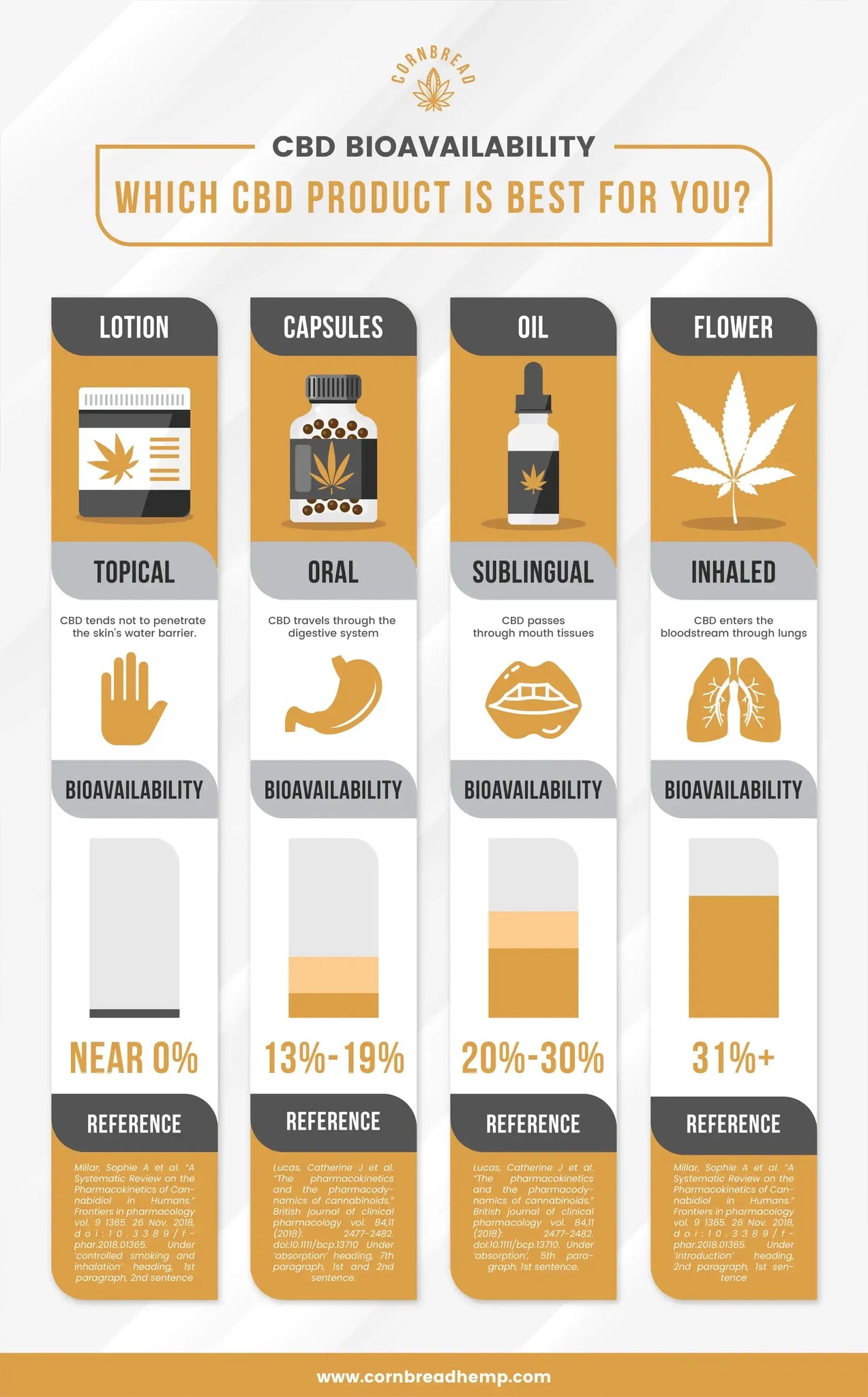
CBD Oil Bioavailability
The effects of hemp-derived CBD oil depend upon its bioavailability. “Bioavailability” means the amount of CBD that you absorb into your bloodstream.5 The dosage and whether you choose the oil or the capsule form of CBD can greatly affect its bioavailability.
Many folks take cannabidiol as an oil under the tongue, or sublingually. We call this “sublingual” because in Latin, “sub-“ means “under.” and “lingual” means “tongue.” When ingested in this way, capillaries in the mucous membrane absorb the cannabinoids directly into the bloodstream.
In this manner, the bioavailability should be between 20 to 30 percent, which means that 20 percent of the amount of cannabidiol in the dose actually absorbs into the bloodstream.6 In a 25 mg dose, you can expect at least 5 mg of actual CBD to enter your system.
CBD Capsule Bioavailability
The biggest difference between CBD oil and CBD capsules is the potential bioavailability.
This is because CBD capsules taken orally are first digested by the stomach and liver. Sublingual CBD oil bypasses this process and digestive system by absorbing directly through the mucous membrane under your tongue.
Therefore, the bioavailability of a swallowed CBD capsule7 is anywhere from 13 percent to 19 percent.8 That means from a 25 mg capsule, you can expect to receive between 3.25 mg and 4.75 mg of cannabidiol into your system.
Onset of Action
Whether you take CBD oil or capsules, you want to keep track of the onset of action, or the time it takes for it to start working. The onset of action for sublingual CBD oil can be anywhere from 15 minutes to an hour.9 For CBD capsules, the onset of action usually takes a full hour.10
Whether taken orally or sublingually, the effects usually last about 6 hours.11 After that, most of the CBD has been metabolized or eliminated from the body.
How to Make Your CBD Oil More Bioavailable
As more people come to cannabidiol, they want to ensure they are getting the most out of their CBD oil. And if not, what can they do to improve their response?
The best way to ensure you get the most out of cannabidiol is to be mindful of a few things. CBD takes a while to begin working, maybe even a few weeks depending on the person.
Therefore, keep a journal of your CBD oil tincture or CBD capsule usage. That journal should include: the issues you are addressing, the dosage of CBD, the frequency of the dose, whether or not the CBD product contains THC, and what time of day you’re taking it.
If using it regularly, try to find a good oral regimen and take it consistently at the same time of day. Consistency is good,12 but sometimes you might also need to shake things up to get things moving.
Here are eight tips for improving the bioavailability of cannabidiol. Please keep in mind that these tips are anecdotal, so your mileage may vary.
Break Through Dosing
In addition to your daily dose, you can give yourself an additional dose when experiencing discomfort. This is called a break-through dose.
Smaller Doses
Instead of taking a full dropper in the morning, try taking half a dropper twice a day. Or even a third three times a day.
Clean Your Mouth
Brushing your teeth before taking a sublingual dose may improve the bioavailability. A cleaner mouth means a cleaner passageway to your bloodstream.
A Longer Resting Period
You may decide to hold a sublingual CBD oil tinctures dose in your mouth for a longer period of time — as much as 60 to 90 seconds. Try swishing it all through your mouth to increase surface contact with the mucous membrane. The more surface contact, the more capillaries to absorb the CBD.
Buccal dosing
You can choose to hold the dose between your cheek and lower gums. This is called a “buccal” dose. This may be an easier method for some people.
Fats are Good
Take CBD with a high fat meal or snack. This is one of the reasons that baking with CBD products is so popular.13
Be Consistent
Keep your choice of snack or meal consistent so the absorption will be similar with each dose. Choose healthy fats and complex carbohydrates.
A Spoonful of Oil
Some people say that taking CBD with an added spoonful of coconut MCT oil could help the CBD in the digestion process.
What is the Best Way to Take CBD?
Whether you’re taking cannabidiol as an oil or capsule, these two simple steps can help you determine the best way to take CBD for you:
1) Monitor — Keep track of your reason for taking cannabidiol. Consider keeping a journal of your daily dosage, including time of day, amount of CBD taken, and how you feel. Evaluate your comfort levels over time.
2) Adjust — If you are not seeing the results you expect, change the dose, how often you take the dose, and/or the time of day of your dose. If you doubt that CBD is helping, stop taking it for a few days to see if your discomfort returns.
Choose wisely. Buy a reputable brand. Some of the cheaper brands are contaminated with solvents, heavy metals, and pesticides. Where the hemp is grown is important: American-grown hemp is good; Kentucky-grown hemp is considered better by many. Always make sure that there is a third party lab report on the product proving its safety.
Also, the consensus is that full spectrum CBD products are better than THC-free CBD, as long as you don’t have a drug test hanging over your head. Furthermore, off-brand CBD products might be diluted or filled with synthetic cannabinoids. To avoid this, look for a CBD brand that offers USDA certified organic CBD products.
Why Choose Cornbread Hemp?
Cornbread Hemp represents the finest in Kentucky hemp traditions. Kentucky has the best hemp growing conditions in the world, with hemp farming traditions spanning the past 250 years. Cornbread Hemp works with Kentucky farmers to produce high quality hemp-derived CBD oil with an emphasis on choosing strains that could help best with your particular issues.
This family-owned business listens to their customers’ feedback to provide optimum customer service along with making the highest quality CBD oils, CBD capsules, and CBD topicals possible. Cornbread Hemp guarantees every product’s safety and potency with third-party lab testing. Full reports are available and easy to access on the company’s website and via QR codes on every bottle of Cornbread Hemp! We even teach you how to read our COA!
Each Cornbread Hemp full spectrum CBD capsule has the same 25 mg dose of CBD as one full dropper of CBD oil. One gelatin softgel contains full spectrum hemp extract and premium MCT oil. Cornbread Hemp packages all of their products in a recyclable dark amber glass bottle to protect the oil from UV light damage, and preserving its quality so our customers can enjoy its maximum potency.
Conclusions
CBD is rapidly becoming a staple in American households. It is important to know that there are many different ways to supplement with CBD, and to discover which way is best for you!
CBD isolate capsules are a super convenient option for people to incorporate into their busy lives and can be taken anywhere privately without the awkwardness of using a dropper. Cornbread Hemp’s CBD capsules are filled with full spectrum Kentucky-sourced hemp-derived CBD oil that are fully lab-tested by a third party for safety and purity.
Each bottle of Cornbread Hemp CBD capsules has 30 soft gels with 25 mg of full spectrum CBD oil per capsule. Our subscription service makes it easy to stay stocked with your monthly supply of CBD capsules, and at a discount! But if oils and capsules are not your thing, don't fret! Our CBD gummies with THC are our best-selling and most delicious product available.










 Log in
Log in















